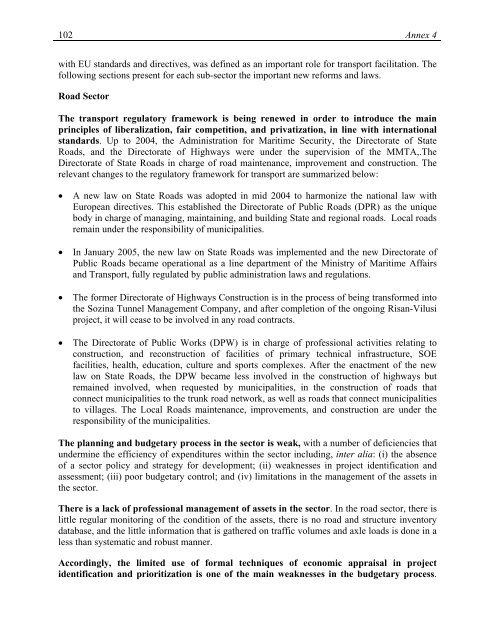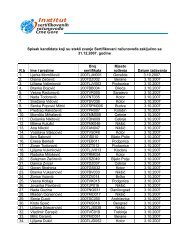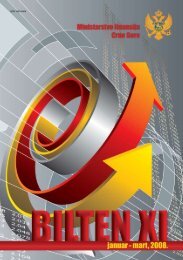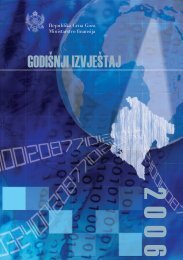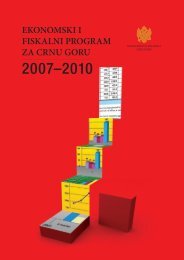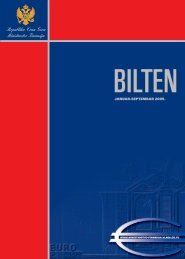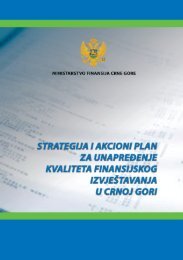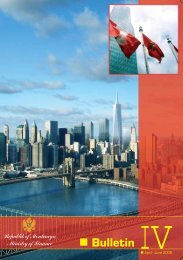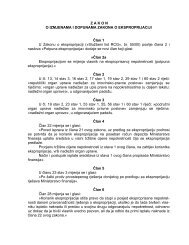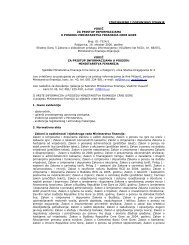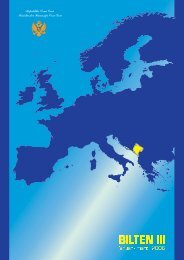Republic of Montenegro: Public Expenditure and ... - Vlada Crne Gore
Republic of Montenegro: Public Expenditure and ... - Vlada Crne Gore
Republic of Montenegro: Public Expenditure and ... - Vlada Crne Gore
Create successful ePaper yourself
Turn your PDF publications into a flip-book with our unique Google optimized e-Paper software.
102 Annex 4<br />
with EU st<strong>and</strong>ards <strong>and</strong> directives, was defined as an important role for transport facilitation. The<br />
following sections present for each sub-sector the important new reforms <strong>and</strong> laws.<br />
Road Sector<br />
The transport regulatory framework is being renewed in order to introduce the main<br />
principles <strong>of</strong> liberalization, fair competition, <strong>and</strong> privatization, in line with international<br />
st<strong>and</strong>ards. Up to 2004, the Administration for Maritime Security, the Directorate <strong>of</strong> State<br />
Roads, <strong>and</strong> the Directorate <strong>of</strong> Highways were under the supervision <strong>of</strong> the MMTA,.The<br />
Directorate <strong>of</strong> State Roads in charge <strong>of</strong> road maintenance, improvement <strong>and</strong> construction. The<br />
relevant changes to the regulatory framework for transport are summarized below:<br />
• A new law on State Roads was adopted in mid 2004 to harmonize the national law with<br />
European directives. This established the Directorate <strong>of</strong> <strong>Public</strong> Roads (DPR) as the unique<br />
body in charge <strong>of</strong> managing, maintaining, <strong>and</strong> building State <strong>and</strong> regional roads. Local roads<br />
remain under the responsibility <strong>of</strong> municipalities.<br />
• In January 2005, the new law on State Roads was implemented <strong>and</strong> the new Directorate <strong>of</strong><br />
<strong>Public</strong> Roads became operational as a line department <strong>of</strong> the Ministry <strong>of</strong> Maritime Affairs<br />
<strong>and</strong> Transport, fully regulated by public administration laws <strong>and</strong> regulations.<br />
• The former Directorate <strong>of</strong> Highways Construction is in the process <strong>of</strong> being transformed into<br />
the Sozina Tunnel Management Company, <strong>and</strong> after completion <strong>of</strong> the ongoing Risan-Vilusi<br />
project, it will cease to be involved in any road contracts.<br />
• The Directorate <strong>of</strong> <strong>Public</strong> Works (DPW) is in charge <strong>of</strong> pr<strong>of</strong>essional activities relating to<br />
construction, <strong>and</strong> reconstruction <strong>of</strong> facilities <strong>of</strong> primary technical infrastructure, SOE<br />
facilities, health, education, culture <strong>and</strong> sports complexes. After the enactment <strong>of</strong> the new<br />
law on State Roads, the DPW became less involved in the construction <strong>of</strong> highways but<br />
remained involved, when requested by municipalities, in the construction <strong>of</strong> roads that<br />
connect municipalities to the trunk road network, as well as roads that connect municipalities<br />
to villages. The Local Roads maintenance, improvements, <strong>and</strong> construction are under the<br />
responsibility <strong>of</strong> the municipalities.<br />
The planning <strong>and</strong> budgetary process in the sector is weak, with a number <strong>of</strong> deficiencies that<br />
undermine the efficiency <strong>of</strong> expenditures within the sector including, inter alia: (i) the absence<br />
<strong>of</strong> a sector policy <strong>and</strong> strategy for development; (ii) weaknesses in project identification <strong>and</strong><br />
assessment; (iii) poor budgetary control; <strong>and</strong> (iv) limitations in the management <strong>of</strong> the assets in<br />
the sector.<br />
There is a lack <strong>of</strong> pr<strong>of</strong>essional management <strong>of</strong> assets in the sector. In the road sector, there is<br />
little regular monitoring <strong>of</strong> the condition <strong>of</strong> the assets, there is no road <strong>and</strong> structure inventory<br />
database, <strong>and</strong> the little information that is gathered on traffic volumes <strong>and</strong> axle loads is done in a<br />
less than systematic <strong>and</strong> robust manner.<br />
Accordingly, the limited use <strong>of</strong> formal techniques <strong>of</strong> economic appraisal in project<br />
identification <strong>and</strong> prioritization is one <strong>of</strong> the main weaknesses in the budgetary process.


